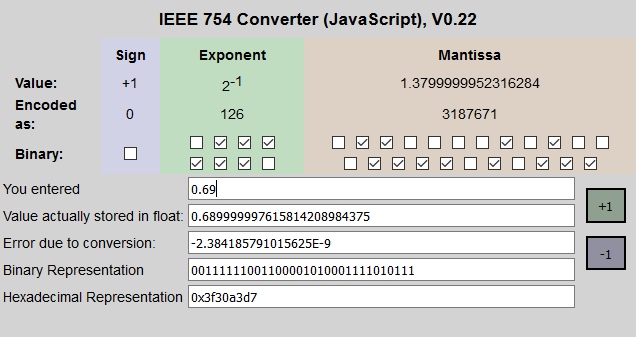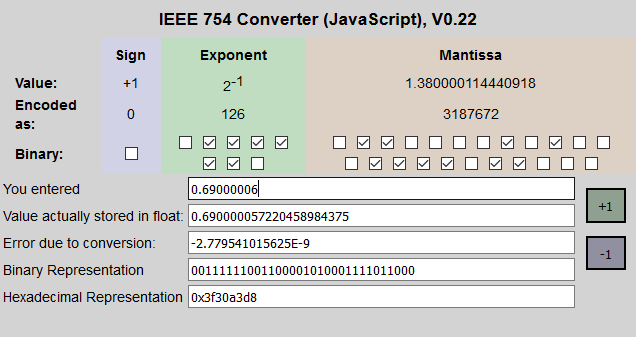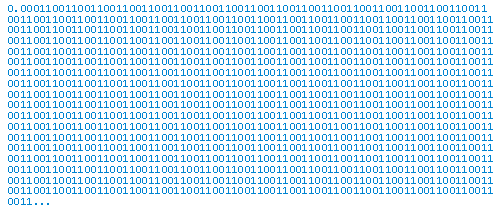
- www.mql5.com
Forum on trading, automated trading systems and testing trading strategies
Do I have to NormalizeDouble Everything ?
Fernando Carreiro, 2023.07.05 06:20
As already explained, floating point numbers are represented in binary form, not in decimal form. It is impossible to limit the number of "decimal" digits internally.
All you can do is approximate it, which is what NormaliseDouble already does, but you can never get to an exact decimal place because it is binary, not decimal.
Forum on trading, automated trading systems and testing trading strategies
MathRound fails for one particular number
Fernando Carreiro, 2018.01.01 22:08
He means that the value "0.69" cannot be exactly represented given the way a floating point number works (based on binary and not decimal representation) - hence, why the value gets represented as "0.68999999..." (see below).
You can never really "normalize" it and it is the main reason why both @whroeder1 and myself contest the use of the NormalizeDouble() function. It should in the very least be renamed to something like "RoundDigits()" because it is more of a "rounding" function and does not "normalize" in any way or fashion.
https://www.h-schmidt.net/FloatConverter/IEEE754.html
EDIT: Please note that the above images are for examples of representation in the 4-byte "float", and not the 8-byte "double" which offers more precision but still cannot represent the value "0.69" exactly due to the "binary" nature of the format.
EDIT2: For future readers that have difficulty understanding (or accepting) this concept, of decimal values not having an exact representation with a "float" or a "double", here is an article worth reading:
Why 0.1 Does Not Exist In Floating-Point
Many new programmers become aware of binary floating-point after seeing their programs give odd results: “Why does my program print 0.10000000000000001 when I enter 0.1?”; “Why does 0.3 + 0.6 = 0.89999999999999991?”; “Why does 6 * 0.1 not equal 0.6?” Questions like these are asked every day, on online forums like stackoverflow.com.
The answer is that most decimals have infinite representations in binary. Take 0.1 for example. It’s one of the simplest decimals you can think of, and yet it looks so complicated in binary:
Decimal 0.1 In Binary ( To 1369 Places
The bits go on forever; no matter how many of those bits you store in a computer, you will never end up with the binary equivalent of decimal 0.1.
... Read the rest of the article at: http://www.exploringbinary.com/why-0-point-1-does-not-exist-in-floating-point/
Sorry, but those references are complicated.
Why don't you try to explain my code line by line ?
So, questions:
1. Is askprice1 a 5 decimal number ?
2. Is bidprice1 a 5 decimal number ?
3. What about spread1 ?
4. Is askprice2 a 5 decimal number ?
5. Is bidprice2 a 5 decimal number ?
6. What about spread2 ?
If you wan to have a nice formatted output of decimal number use DoubleToString().
It is what it is. Format it or have a random number of decimal places. Up to you
I think I have found another solution (as you can also see in the image attached), by using NormalizeDouble() function just for spread variable:
double askPrice = SymbolInfoDouble(_Symbol, SYMBOL_ASK); double bidPrice = SymbolInfoDouble(_Symbol, SYMBOL_BID); double spread = NormalizeDouble(askPrice - bidPrice, 5); Comment("askPrice = " + askPrice + "\nbidPrice = " + bidPrice + "\nspread = " + spread);
Sorry, but those references are complicated.
Why don't you try to explain my code line by line ?
So, questions:
1. Is askprice1 a 5 decimal number ?
2. Is bidprice1 a 5 decimal number ?
3. What about spread1 ?
4. Is askprice2 a 5 decimal number ?
5. Is bidprice2 a 5 decimal number ?
6. What about spread2 ?
Answering questions as one — all the "double" numbers are floating point and have no fixed number of decimal digits.
You will have to learn this by following the links and researching how binary floating point numbers work.
If you don't learn this, then you will always be handicapped in your coding.
I think I have found another solution (as you can also see in the image attached), by using NormalizeDouble() function just for spread variable:
This is an illusion that sometimes works: https://www.mql5.com/en/forum/316484

- 2019.06.25
- www.mql5.com
- Free trading apps
- Over 8,000 signals for copying
- Economic news for exploring financial markets
You agree to website policy and terms of use



Hi,
Looking at the image attached and the code below, can you explain, in detail, why spread1 and spread2 are not 5 decimal numbers ?
Thank you for your time !